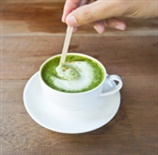Jessica Alba drinks it as part of her daily morning routine, Angelina Jolie’s surgeon, Dr. Kristi Funk lists it as essential for fighting and preventing cancer, Jamie Oliver’s food tube recommends it for a super nutritious breakfast smoothie, health-conscious Gwyneth Paltrow was even giving Matcha latte’s away at her recent Pop-Up Shop in New York. Pinterest is bursting with recipes including it in all sorts of culinary wonders. Matcha green tea truly has taken over the world.
Why it’s so popular and why you might want to join the following
Matcha (pronounced Muh-chuh) is not new, it’s been around for years in Japan. Matcha is purely green tea ground into a fine powder, the word ‘matcha’ literally means ‘powder tea’. In fact it was originally used by monks to increase their focus for meditation. Even Samurai warriors used it to keep up their energy. Green tea was initially used for its medicinal value and it eventually became a highly prized beverage brewed as part of the traditional tea ceremony. Zen monks brought green tea to Japan in the 8th century, which is where the highest quality Matcha is grown.
Why is it so expensive?
Matcha is a bit more costly than ordinary green tea, though. This is because of its strict growing process. Firstly, the most fertile soil is chosen and seeds are planted. Twenty days before the harvest, the leaves are shaded to allow the chlorophyll to increase and the leaves to develop to the deepest green. The best Matcha leaves are individually hand-picked by tea-harvesters, and then air-blasted, steamed, dried in a brick oven, mixed to keep the quality even and then stone ground by a traditional ‘hikiusu’. The stone-grinding process takes one hour to grind up just 40g of Matcha powder.
The best plantations take pride in their Matcha leaves and grow according to very strict standards to achieve a vibrant, green powder. When you make your cup of Matcha, it should also have a lovely, green, silky froth on top which distinguishes it from poorly whisked Matcha, similar to a good ‘crema’ on a well espressed coffee. A good Matcha should not have a bitter taste and tastes slightly nutty in flavour.
More than the taste though, the health benefits are the crux of why Matcha has become so popular. The touted health benefits really are quite impressive.
Need more convincing? Read this…
• One cup of Matcha is basically equal to 10 cups of ordinary green tea. In fact, a study conducted by the University of Colorado found that the catechin, EGCG is 137 times stronger in Matcha than ordinary green teas. EGCG is an antioxidant which has been shown to fight chronic diseases, specifically cancer, and can even reduce tumours.
• The antoxidant is also 6 times stronger than Goji berries, and 15 times stronger than Blueberries, both highly recommended for their antioxidant value.
• The high concentration of chlorophyll because of the shading process, also makes Matcha tea an excellent detoxifier.
• The combination of Vitamin C, Vitamin E and EGCG also works together to reduce blemishes, wrinkles and sun damage, like a skin care product that works from the inside out.
• People who use Matcha have said that they feel their energy is constant or increases throughout the day, because of the natural caffeine which is tempered by the Theanine. A better option than other stimulants because there is no jittery feeling or up and downs in energy levels. Some people have been able to break their addiction to harmful caffeine stimulants by drinking Matcha.
• Gargling with Matcha can even help prevent flu and infections, and boost gum health!
• With a normal tea, the leaves are steeped and then thrown away, taking with them many of the benefits. When you drink a cup of Matcha, the whole leaf is ground up so you get the full nutritional value, without anything wasted.
• The EGCG also increases metabolism and fat-burning capabilities, as well as helping to stop the growth of new fat cells.
Having a look online brings up a host of other reasons to be drinking it, but we are pretty much sold on it being something we want to be drinking as part of our daily routine. And the idea is, you’ll only need one cup a day to get the benefits, so maybe it doesn’t need to break the bank. If it’s good enough for Jessica Alba, we think it deserves a closer look!
Although it’s readily available in the States and elsewhere, it’s quite difficult to find in South Africa, because it has to be imported directly from Japan. On the upside, on our last visit to Mugg and Bean, we saw they have it on the menu, so hopefully this means that more South Africans will soon be on the Matcha train.
You can find out more and buy it online here at Just Matcha.

